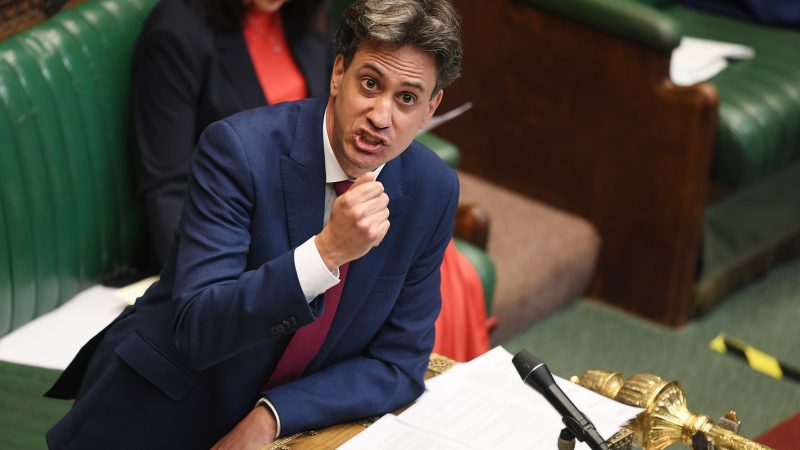
Labour’s Ed Miliband has criticised the government for failing to tackle supply chain disruption, demanding that ministers “get a grip” on the issue and adopt a five-point plan being put forward by the opposition party.
As major retailers report their lowest stock levels in decades, following worker shortages and transport disruption caused by Covid and Brexit, the Shadow Business Secretary urged the government to listen to those in the sector.
“While they act as if the problem will solve itself, businesses are telling government these problems are only going to grow. The serious disruption and added costs risk harming our recovery and passing costs to consumers,” Miliband said.
“Ministers have a habit of ignoring warnings and shifting the burden of blame to businesses. But it is their undermining of our country’s skills training system, failure to deliver on their promise to cut barriers facing businesses and belief in an insecure labour market with poor terms and conditions that has created this crisis.
“The long-term problems in the HGV sector will not be solved by making drivers work longer hours but by training workers and improving their terms and conditions. What we are seeing across our economy should be a wake-up call to government that insecurity and low pay cannot build the high performing economy we need.”
The chair of a cross-party commission of MPs and business representatives created to scrutinise the post-Brexit deal warned ministers earlier this week that they needed to act now to avoid empty shelves in the run-up to Christmas.
Food, retail and logistics representatives have told the commission that supply chain difficulties are expected to last until the end of the year and could get worse when post-Brexit checks on goods coming from the EU are introduced from October.
The government delayed introducing post-Brexit checks on EU goods entering Britain by six months in March because the required infrastructure would not have been in place, but from October 1st imports containing animal products and food considered high risk will require health certificates and pre-notification of shipment.
“It’s time for the Prime Minister to take this situation seriously and appoint a minister to work across government and come up with a clear plan with businesses and unions to improve wages and conditions in key sectors,” Miliband added.
“Any responsible government would act to sort out the problems firms are facing. This is what Britain’s businesses, workers and consumers have a right to expect.”
Labour has warned of the impact of disruption, with shops cancelling deliveries, running out of goods and issuing warnings about serious problems in advance of the Christmas shopping period, and is calling on the government to:
- “Appoint a government minister with specific responsibility for tackling the supply chain crisis and coordinating across multiple government departments;
- “Set up a taskforce to work sector by sector to identify gaps and recruit into key roles. This should include rapidly expanding testing for HGV drivers, and part or wholly funding HGV training drawing on available funding for targeted sectors. The government should also support 100,000 new apprentices this financial year to help boost employment in key sectors;
- “Bring together business and unions to address long-term issues of wages and conditions in key sectors to agree improved terms and conditions, recognising that the government’s belief in a low-wage, insecure labour market is key to the crisis we are seeing;
- “Refer the issue of adding HGV drivers to the shortage occupation list to the migration advisory committee to provide advice to government to help address the crisis in the short-term, given warnings from businesses about the risk to Christmas trade;
- “Limit further disruption to supply chains from the planned introduction of initial food import controls on October 1st by working to secure an urgent veterinary agreement with the EU.”
The UK is short of around 100,000 HGV drivers, according to the Road Haulage Association, with new recruits to the industry facing problems getting driving tests due a Covid-related backlog. Hauliers have also blamed post-Brexit immigration rules.
Business Secretary Kwasi Kwarteng rejected calls this week to make any changes to immigration rules, arguing that doing so would be only a “short-term temporary solution”. He insisted that firms should employ UK workers.
Drivers in the industry have cited their conditions of employment as a reason for the shortage. Career HGV driver Nick Downing told the BBC that he could not recommend the job to young people as conditions “get worse every week”.




More from LabourList
‘The hope that kills you’: Reflections from the final day in Gorton and Denton
MPs, union leaders and organisations react to ‘bruising’ Gorton and Denton result
A gory night for Labour